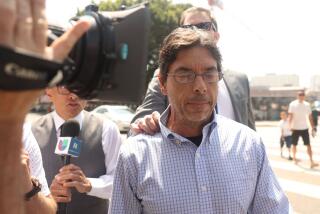Doctor administered drug, then left Jackson, sources say
- Share via
Michael Jackson’s personal physician left the performer alone and under the influence of a powerful anesthetic to make telephone calls the morning the pop singer died, according to three people familiar with the investigation.
By the time the doctor had returned, Jackson had stopped breathing, the sources said.
Dr. Conrad Murray, identified in court records as a suspect in a police manslaughter investigation, legally acquired the operating room drug propofol from a Las Vegas pharmacy and gave it to Jackson as a treatment for insomnia, said the sources, who spoke on the condition that they not be named because the investigation was ongoing.
Murray acknowledged obtaining and administering the medication in an interview with Los Angeles police detectives two days after Jackson’s death, the sources said.
He reportedly told them that the singer had returned to his rented Holmby Hills mansion early on June 25 exhausted from a lengthy concert rehearsal and was unable to sleep.
Jackson had been using propofol as a sleep aid on and off for a decade, according to one law enforcement source. Murray told investigators that he had given Jackson multiple doses of the drug since taking a $150,000-a-month job as his doctor in May, the sources said. The 51-year-old cardiologist told detectives that since there had never been a problem in the past, he felt comfortable leaving Jackson alone while he made calls on his mobile phone, the sources said.
It’s unclear how long Murray was out of Jackson’s bedroom. When he returned, the 50-year-old pop star was not breathing. Murray performed CPR, and another person called 911. Paramedics arrived and rushed Jackson to UCLA Medical Center, where he was pronounced dead at 2:26 p.m.
Murray has maintained that he did nothing wrong. His attorney, Edward Chernoff, has repeatedly declined to say whether his client gave Jackson propofol. Asked this week about the version of events outlined by sources, the lawyer said, “I’m not going to dispute the police officers’ claims in that regard. They were there at the interview, and Dr. Murray did not lie to them. But they are not telling the whole story.”
Chernoff confirmed that the doctor had spent time on the phone talking to family members and employees in his medical offices before he discovered Jackson stricken in his bedroom.
Investigators have focused on whether Murray’s use of propofol outside the hospital setting and his decision to leave Jackson alone amounted to a level of negligence required for an involuntary manslaughter charge. The Los Angeles County coroner’s office has already concluded its investigation into Jackson’s death but has not released its findings at the request of the Los Angeles Police Department.
Evidence developed over the course of the investigation suggests the propofol admission alone may not be enough to charge Murray with manslaughter. Other prescription drugs, including an anti-anxiety medication, were found in Jackson’s system along with propofol. The law enforcement source said the presence of the other drugs could complicate any prosecution.
The other drugs may have amplified the effects of the anesthetic and depressed Jackson’s breathing, sources said. Another factor is Jackson’s history of drug addiction, and his prior use of propofol particularly.
In an interview Wednesday, Chernoff suggested that Murray had not realized what he was getting into when he agreed to become Jackson’s doctor.
“When he accepted the job, he was not aware of any specific requirements regarding medications that Michael Jackson was taking or any addictions that he was suffering from,” Chernoff said. But after relocating to L.A., Murray “realized that Michael Jackson had some very unusual problems,” the lawyer said.
He criticized what he called selective leaks by investigators and said they had rushed to portray Murray as guilty and the anesthetic as the cause of Jackson’s death.
“From the beginning, they leaked that propofol killed him. It has appeared the investigation was designed to support a conclusion they already made with regard to Dr. Murray,” the attorney said.
He said it was evident that investigators thought drugs other than propofol played a role in Jackson’s death based on their searches of Murray’s properties in Las Vegas and Houston. Investigators were looking for evidence that he prescribed the other medications for Jackson, Chernoff said.
“I have no doubt they came up completely empty in that regard,” he said.
Murray is one of at least five doctors whose conduct is being examined by the LAPD and the Drug Enforcement Administration in connection with Jackson. Although several physicians have had records subpoenaed by the coroner’s office, Murray has been the only one publicly identified as a suspect.
--
andrew.blankstein@latimes.com
richard.winton@latimes.com
More to Read
Sign up for Essential California
The most important California stories and recommendations in your inbox every morning.
You may occasionally receive promotional content from the Los Angeles Times.














